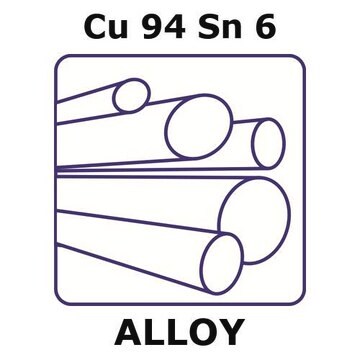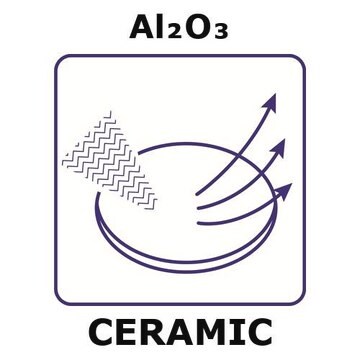GF63698305
Iridium
microfoil, disks, 10mm, thinness 0.1μm, specific density 224μg/cm2, permanent mylar 3.5μm support, 99.9%
Sinónimos:
Iridium, IR004500
Iniciar sesiónpara Ver la Fijación de precios por contrato y de la organización
About This Item
Fórmula empírica (notación de Hill):
Ir
Número de CAS:
Peso molecular:
192.22
MDL number:
UNSPSC Code:
12352300
PubChem Substance ID:
NACRES:
NA.23
Productos recomendados
assay
99.9%
form
foil
manufacturer/tradename
Goodfellow 636-983-05
resistivity
4.71 μΩ-cm
bp
4130 °C (lit.)
mp
2450 °C (lit.)
density
22.65 g/cm3 (lit.)
SMILES string
[Ir]
InChI
1S/Ir
InChI key
GKOZUEZYRPOHIO-UHFFFAOYSA-N
¿Está buscando productos similares? Visita Guía de comparación de productos
Categorías relacionadas
General description
For updated SDS information please visit www.goodfellow.com.
Legal Information
Product of Goodfellow
Certificados de análisis (COA)
Busque Certificados de análisis (COA) introduciendo el número de lote del producto. Los números de lote se encuentran en la etiqueta del producto después de las palabras «Lot» o «Batch»
¿Ya tiene este producto?
Encuentre la documentación para los productos que ha comprado recientemente en la Biblioteca de documentos.
Soo Bong Han et al.
Chemical communications (Cambridge, England), (47)(47), 7278-7287 (2009-12-22)
Existing methods for enantioselective carbonyl allylation, crotylation and tert-prenylation require stoichiometric generation of pre-metallated nucleophiles, and often employ stoichiometric chiral modifiers. Under the conditions of transfer hydrogenation employing an ortho-cyclometallated iridium C,O-benzoate catalyst, enantioselective carbonyl allylations, crotylations and tert-prenylations are
Paolo Tosatti et al.
Organic & biomolecular chemistry, 10(16), 3147-3163 (2012-03-13)
Since their discovery in 1997, iridium-catalysed asymmetric allylic substitutions have been developed into a broadly applicable tool for the synthesis of chiral building blocks via C-C and C-heteroatom bond formation. The remarkable generality of these reactions and the high levels
Stephen J Roseblade et al.
Accounts of chemical research, 40(12), 1402-1411 (2007-08-04)
Asymmetric hydrogenation is one of the most important catalytic methods for the preparation of optically active compounds. For a long time the range of olefins that could be hydrogenated with high enantiomeric excess was limited to substrates bearing a coordinating
Low-valent ruthenium and iridium hydride complexes as alternatives to Lewis acid and base catalysts.
S Murahashi et al.
Accounts of chemical research, 33(4), 225-233 (2000-04-25)
The discovery of a new chemical reaction often leads to new applications and new chemical principles. Low-valent ruthenium and iridium hydride complexes are highly useful redox Lewis acid and base catalysts. Nitriles are activated by these catalysts and undergo reactions
Veronica Marin et al.
Chemical Society reviews, 36(4), 618-635 (2007-03-28)
The need for novel materials with luminescent properties and advanced processing features requires reliable and reproducible synthetic routes for the design of suitable materials, such as e.g. polypyridyl ruthenium(II) and iridium(III)-containing polymers. The most popular ligand for those purposes is
Nuestro equipo de científicos tiene experiencia en todas las áreas de investigación: Ciencias de la vida, Ciencia de los materiales, Síntesis química, Cromatografía, Analítica y muchas otras.
Póngase en contacto con el Servicio técnico


